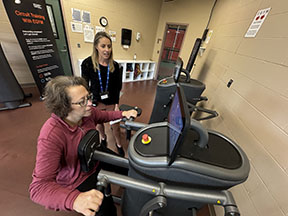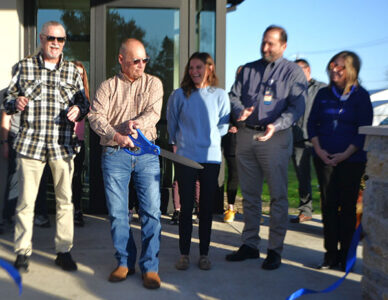Special Services director Matt Cretsinger’s last day at MCSD is Dec. 31

T-R FILE PHOTO Marshalltown Community School District Director of Special Services Matt Cretsinger, during an April meeting, recommends a pilot program in which two school-based therapists would be hired. Cretsinger recently resigned from his position with the MCSD and will begin the new year at the Heartland Area Education Agency.
A familiar leader in the Marshalltown Community School District (MCSD) will begin a new chapter in 2025. Director of Special Services Matt Cretsinger will become a regional special education director with the Iowa Department of Education (DOE) in the Des Moines and central Iowa area. Tuesday will officially be the last day of Cretsinger’s 13 years at MCSD, and he will start his new job on Jan. 3.
“It’s a pretty quick turnaround,” Cretsinger said.
Besides duties and environment, he will have to adjust to the shortened commute. Cretsinger has lived in Bondurant during his time in Marshalltown.
“I’m one of those people who appreciates a little bit of windshield time to process through the day and transition from my work into my personal life,” he said. “I’ve always enjoyed the commute.”
After working at Heartland Area Education Agency (AEA) in Johnston, Cretsinger accepted the MCSD position as director of Special Services because Marshalltown reminded him of his hometown of Perry.
“I thought about the community and the demographics, and some of the unique challenges that come with a diverse community,” he said.
After Cretsinger met some of the MCSD staff members, it solidified his decision.
“If you spend any time with them, they’re fantastic,” Cretsinger said. “Whether it was administrators or teachers on my interview team, they were really committed to trying to do whatever they needed to for the kids. I thought what a great opportunity to work with very willing people, even if I bring very different ideas forward.”
At the first December meeting, MCSD school board members heard a proposal to replace Cretsinger with two people — one focusing on special education and the other on special services. Cretsinger feels good about the action, as his position was originally two, he said. The decision reducing it to one position was made before Superintendent Theron Schutte came to the district in 2016.
“Since [Schutte] has been here, the work has increased,” he said. “I’m feeling really good (that) there will be two people trying to make sure everything moves forward. I feel good about the special education services we offer our families. We have a nice continuum. On the other hand, we’ve become a model for other districts across the state and the nation. That takes time and attention. Knowing two people will keep that work going makes me feel pretty good.”
For whomever is hired by the board, Cretsinger encourages them to talk to people who have been doing the work, and develop an understanding of why they do it.
“I’m sure Dr. Schutte is going to find great administrators to step in,” he said. “He has a knack for recruiting high-quality talent. I encourage them to know what has been done before and why. I think if they understand the why, they will be in a better position to make whatever choices.”
Special services
During his tenure with MCSD, Cretsinger expanded the Special Services department, bringing in new programs and employees to meet emotional needs. One factor which made him key to the expansion was that he came to the district as a mental health professional.
“I have a different perspective and a lot of experience,” Cretsinger said. “I think the other thing I bring, when I worked for Heartland AEA, I spent a lot of time trying to understand what are the things that make a difference for learners. . . So, I was bringing those two buckets of knowledge here, which were unique for the candidates they had at the time.”
Using his knowledge and previous experience, the programs he implemented have positively impacted students. Cretsinger said Therapeutic Classroom was one of the first. The program addresses the mental health of students while providing education.
The success has drawn the attention of 40 school districts, the AEAs and the DOE. Since its inception 12 years ago, Therapeutic Classroom has reduced the need for physical restraints by 90 percent; 78 percent of students made academic progress and; 95 percent of the parents want their children to remain in the program due to the successes.
“It’s been spoken about as a model for the state in many ways,” he said.
Upon Cretsinger’s recommendation, the school board approved a pilot program hiring two school-based therapists back in April, a move many school districts do not make.
“I think that’s a big difference because when positions like that work for you, the number of things they can offer to a teen and parents just expand,” he said.
Special Services also expanded the at-risk programming under Cretsinger’s watch and sought to bring in school resource specialists.
“School-based behavioral health has a number of layers just like you would teach anyone to read or understand math,” he said. “Bringing that perspective and helping teachers understand if they want a student to focus and do all of the academics, there is another part that has to be met. That has been something we have spent a lot of time and energy on. Probably one of the things I’m proudest of.”
Cretsinger has seen more students utilize the Special Services department in the 13 years. There were slight upticks after the pandemic, tornado and derecho.
“Our kids’ needs are just super complex now,” he said. “It’s not as simple as thinking one-dimensional about them. We truly have to think holistically. What do they need to feel safe at school, feel engaged at school, and how do we need to teach them in a way their brain will absorb that information as quickly as possible?”
Time at MCSD
It was difficult to choose a favorite MCSD memory, but Cretsinger settled on bringing Stuart Ablon to Marshalltown as a keynote speaker after the tornado. Ablon is an associate professor at Harvard Medical School and a child and adolescent psychiatrist at Massachusetts General Hospital.
“It was amazing seeing [the staff’s] engagement,” he said. “They weren’t steering away from the conversation, they were pushing into it. That’s one of my favorite memories – seeing people think about things where most schools don’t and not being afraid to step into it.”
The biggest challenge Cretsinger tackled was keeping up with population changes.
“I think our community continues to evolve,” he said. “We’ve always had a lot of different languages spoken in our schools. We continue to have more languages, and dialects, so that’s one thing we always have to work through.”
He said his department also saw the needs of staff members. Thankfully, the district’s proactive approach to the mental health of staff has created an environment with a low burnout rate.
“They’re trying to be everything for everyone,” Cretsinger said. “Most recently we have put a lot of time and energy into staff wellness and commitment. We want them to do their job at high levels, but we also want a balanced lifestyle. If they need to take a break, they just ask for it.”
The people are what Cretsinger will miss the most after he leaves on Tuesday.
“Being here this long, there’s a lot of great relationships,” he said. “I got to know people not only as professionals, but personally. That will be the hardest thing to step away from.”
Contact Lana Bradstream at 641-753-6611 ext. 210 or lbradstream@timesrepublican.com.





